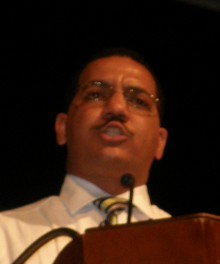Archive for November 29th, 2009

School dispute won’t prevent education changes
 (CNS): Education Minister Rolston Anglin said this week that, despite the fact that he has issued a notice to quit to the general contractor on the two new high school projects, therestructuring of school organization will not be dependent on the building schedule. The minister gave notice of termination to Tom Jones International (TJI) last Wednesday, claiming breach of contract following the stoppage of work at the two sites earlier this month. Although government has given no details of what its intention is for the partially built sites, the goal of completing both schools by September 2010 is now elusive.
(CNS): Education Minister Rolston Anglin said this week that, despite the fact that he has issued a notice to quit to the general contractor on the two new high school projects, therestructuring of school organization will not be dependent on the building schedule. The minister gave notice of termination to Tom Jones International (TJI) last Wednesday, claiming breach of contract following the stoppage of work at the two sites earlier this month. Although government has given no details of what its intention is for the partially built sites, the goal of completing both schools by September 2010 is now elusive.
“If the new school buildings are not yet ready at the start of the 2010 school year, the move to all-through school will still happen using existing facilities,” the minister said. “We need to decouple construction from much needed educational improvements."
Plans are still in motion to introduction the changes to the Cayman Islands education system, as envisioned in the new education law passed by the previous administration, including the change from the current middle school/high school arrangement to two “all-through” high schools in Grand Cayman, which will cater to students aged from 11 to 16 years.
Although during the election the UDP had talked of developing a separate vocational institution, the new administration has now revealed that it will be using George Hicks as the technical centre for post-sixteen education as intended by the previous minster. However, the implementation of the new education law, which was passed in March 2009, is still in question. Although that law was intended to come into effect for the 2009/10 school year, when he came to office and was appointed education minister, Anglin said there was not enough time to complete the regulations by then, so the date the law would be implemented was postponed and as yet no new date has been set.
Under the forthcoming educational plan, however, which is effective September 2010, students within each high school will be organized in academies, each with 250 – 300 students in Years 7 through11. A student will then normally remain in the same academy throughout their secondary education years the ministry said.
In Years 7 through 9, when children first enter high school, classes will be conducted in the academy group, allowing the younger students the security of a smaller setting within the larger school. As students move into Years 10 and 11, they will have more opportunities for joining classes alongside students from other academies across the whole school, particularly in option subjects.
The ministry stated that this would allow older students access to a greater range of specialized subjects and helps prepare them for the challenges of further study and the world of work.
Students will then sit their CXC/GCSE examinations at the end of Year 11 from 2010 onwards. For the mandatory Year 12, students will be able to choose a personalized plan of study at the redeveloped George Hicks Centre for Further Education.
“This reorganization of secondary education will offer a number of advantages for students”, says Chief Education Officer Shirley Wahler. “Most importantly, it will remove the disruption in education many students currently experience in changing schools from middle school to high school – a shift that occurs just as students are preparing for their critical examination years.”
She said the continuity provided by all-through secondary schools would enable teachers to get to know and nurture students over a longer period, allowing for better knowledge of their needs. She said it also permits a smooth transition to examination preparation in each subject area, as the same teachers are involved with students throughout their secondary studies.
Education Ministry Chief Officer Mary Rodrigues explained that the smaller size of the academy groupings will “help to foster strong relationships and a sense of belonging for the students.”

UK Tory candidate’s cash held in the Cayman Islands
 (Standard): High-profile Conservative party millionaire, candidate Zac Goldsmith is facing pressure to end his "non-dom" tax status as the party struggles to fend off claims that it wants to featherbed the rich. Goldsmith was accused of a "cynical" attempt to avoid taxes after it emerged that he benefited from a device normally used by wealthy foreigners working in Britain. Goldsmith, who grew up in Britain, claimed that his wealth will make him a good MP. "I was born into a position of privilege and am therefore not corruptible." He inherited a £200m fortune and said he was "non-domiciled" due to his late Anglo-French father’s own tax status. The bulk of his inheritance is said to remain in a Cayman Islands based family trust.
(Standard): High-profile Conservative party millionaire, candidate Zac Goldsmith is facing pressure to end his "non-dom" tax status as the party struggles to fend off claims that it wants to featherbed the rich. Goldsmith was accused of a "cynical" attempt to avoid taxes after it emerged that he benefited from a device normally used by wealthy foreigners working in Britain. Goldsmith, who grew up in Britain, claimed that his wealth will make him a good MP. "I was born into a position of privilege and am therefore not corruptible." He inherited a £200m fortune and said he was "non-domiciled" due to his late Anglo-French father’s own tax status. The bulk of his inheritance is said to remain in a Cayman Islands based family trust.

US police tap into ‘text-a-tip’ programs
 (msnbc): After struggling for years with an anti-snitching culture that made witnesses too afraid to come forward, police across the country are getting help from text-a-tip programs that allow people to send anonymous, text messages from their cell phones. In Boston, the first city to heavily promote texting for crime tips, police have received more than 1,000 tips since the program began two years ago. Police credit text tips for providing them with key leads in at least four high-profile killings, including: the accidental shooting of Liquarry Jefferson by his cousin; an arson fire that killed two children; the shooting of a Boston teenager on her 18th birthday; and the fatal stabbing of a man during a bar fight.
(msnbc): After struggling for years with an anti-snitching culture that made witnesses too afraid to come forward, police across the country are getting help from text-a-tip programs that allow people to send anonymous, text messages from their cell phones. In Boston, the first city to heavily promote texting for crime tips, police have received more than 1,000 tips since the program began two years ago. Police credit text tips for providing them with key leads in at least four high-profile killings, including: the accidental shooting of Liquarry Jefferson by his cousin; an arson fire that killed two children; the shooting of a Boston teenager on her 18th birthday; and the fatal stabbing of a man during a bar fight.